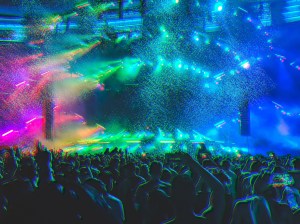Over the last few weeks, Bollywood actor Rhea Chakraborty, who is being investigated for allegedly scamming and abetting the suicide of her late boyfriend, actor Sushant Singh Rajput, has been subjected to a nauseating media trial.
From being called a “gold digger” and “sex bait to trap rich men” to being accused of using “black magic” on Singh Rajput and pushing the late actor to take his own life by squandering his savings, the narrative pushed by some Indian mainstream media channels and social media users has veered in a direction that exemplifies their internalised misogyny.
Videos by VICE
Now, Chakraborty is also being investigated by India’s Narcotics Control Bureau (NCB), a federal agency in charge of combating drug trafficking, after suggestive old WhatsApp chats of hers were uncovered.
Chakraborty’s WhatsApp conversations with friends and Singh Rajput’s house manager Samuel Miranda point towards the actress scoring weed, giving Singh Rajput Cannabidiol (CBD) oil in his tea and even claiming that though she doesn’t do hard drugs, she’s tried MDMA once.
In a video that is now viral on social media, the news channel Times Now suggests that Chakraborty is a seasoned drug user based on a chat where she told her friend that the city of Bhubaneswar, popularly known to be a spot of cannabis cultivation, has the “best weed ever.”
Chakraborty’s chat history is now being harnessed by some media channels to peddle unsubstantiated claims of Chakraborty “dealing drugs”, blatantly suggesting that her drug-related chats must mean she is indeed not to be trusted. It’s also important to note here that how media phrases the allegations go a long way in linking an identity to drug use. So when words like “shocking drug conspiracy” and “shocking drug cartel angle” are thrown around without any verified links between the alleged drug use and the death, it solidifies the dangerous correlation of drug use and evil.
Such coverage, in turn, has prompted several social media users to connect Singh Rajput’s death to her alleged consumption of drugs.
“This narrative [that blames Chakraborty because of her alleged drug use] perpetuates the stigma and stereotype that anybody who uses drugs is a ‘bad influence’ or ‘beyond saving’ or ‘dangerous’,” Kripi Malviya, a Delhi-based psychotherapist and de-addiction expert, told VICE. Malviya, who is the co-founder of Tattva, a drug rehabilitation and therapy centre, spearheads an awareness campaign that encourages conversations around the conscious use of drugs in safe spaces to control any harmful side-effects. She admits that the stereotypical vilification of Chakraborty for talking about drugs could discourage the healthy dialogue around drug use that is essential to making the experience safe.
“Research suggests that drug use is either recreational or directly linked to childhood trauma, emotionally absent parents, anxious, abusive or insecure attachments and dependant relationships,” Malviya points out, revealing that seeing the constant coverage of Chakraborty’s image being maligned for her drug use has been emotionally triggering for many drug users.
“People have reached out to me and said that it has re-triggered their past trauma of being gaslit by their friends or family about their drug use, and when it happens on such a scale, it can alienate the user and even push them to abuse a substance even if they weren’t,” she says, explaining that it may result in a user only surrounding themselves with other users, often even substance abusers, to avoid being looked down upon, which could potentially make their recreational drug use an addictive crutch.
In India, marijuana and MDMA both are criminalised under the Narcotic Drugs and Psychotropic Substances (NDPS) Act, despite the Indian cities of Delhi and Mumbai featuring in the top ten of a global list that reveals the highest consumers of cannabis. Though marijuana has found some amount of social acceptance in recent times—from India’s first medical marijuana clinic being established in January 2020 to the rise of CBD as a wellness ingredient—it continues to be severely criminalised.
While some users do report feeling exceedingly anxious, panicky or nauseated while smoking or ingesting marijuana, the plant is globally acknowledged for its medicinal properties, and commonly used to treat patients with depression and anxiety. CBD oil made from hemp, which does not contain the psychoactive THC component of cannabis, is legal for both recreational and medical purposes in India, and widely used to boost mental health and appetite. In fact, the cannabis plant even features in India’s ancient scriptures, suggesting that the lack of social acceptance around it in certain circles is driven by stereotypical beliefs and misinformation of non-users on a moral high ground.
A 2019 study published in the journal of Visual Communication that analysed the coverage of cannabis by mainstream media outlets in the U.S. from 2013 onwards concluded that conservative channels were more likely to associate marijuana use with laziness or criminal activity. This kind of prejudiced coverage also actively targets minorities and has been used to vilify communities like Latin Americans or the Black people for decades, adding to the persecution and discrimination they face.
So, when a similar school of thought is applied to amplify that an actress, who may or may not be guilty of the crimes she is accused of, is a dangerous influence on society, it not only propagates outdated ideas of drug use being evil and immoral, but also potentially make movements fighting against substance abuse go up in smoke. Sip on that sugarcane juice.
Follow VICE on Twitter and Instagram.
VICE India in no way endorses the illegal usage of marijuana or other narcotics. The content above is intended for educational and informational purposes only, and is not meant to propagate the use of any illegal substance. See Terms of Use for more.










